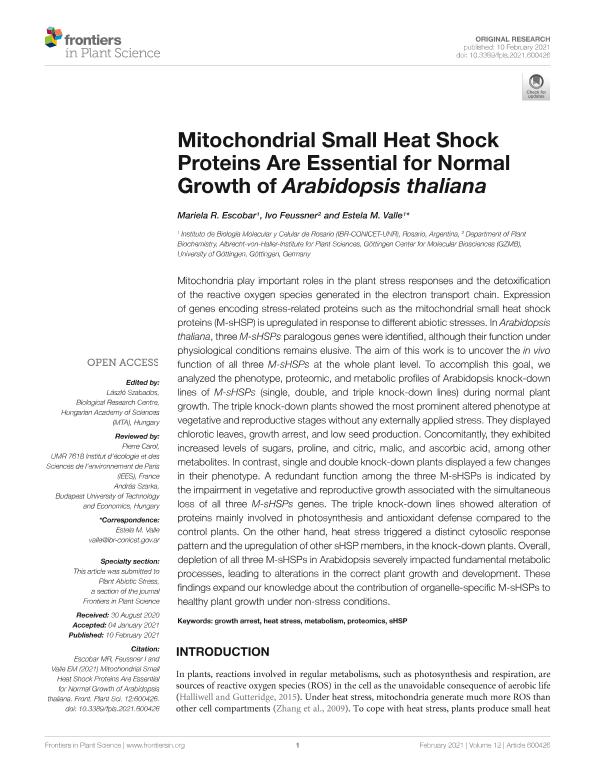Mostrar el registro sencillo del ítem
dc.contributor.author
Escobar, Mariela Raquel

dc.contributor.author
Feussner, Ivo
dc.contributor.author
Valle, Estela Marta

dc.date.available
2023-01-25T10:46:40Z
dc.date.issued
2021-02
dc.identifier.citation
Escobar, Mariela Raquel; Feussner, Ivo; Valle, Estela Marta; Mitochondrial Small Heat Shock Proteins Are Essential for Normal Growth of Arabidopsis thaliana; Frontiers Media; Frontiers in Plant Science; 12; 2-2021; 1-20
dc.identifier.issn
1664-462X
dc.identifier.uri
http://hdl.handle.net/11336/185491
dc.description.abstract
Mitochondria play important roles in the plant stress responses and the detoxification of the reactive oxygen species generated in the electron transport chain. Expression of genes encoding stress-related proteins such as the mitochondrial small heat shock proteins (M-sHSP) is upregulated in response to different abiotic stresses. In Arabidopsis thaliana, three M-sHSPs paralogous genes were identified, although their function under physiological conditions remains elusive. The aim of this work is to uncover the in vivo function of all three M-sHSPs at the whole plant level. To accomplish this goal, we analyzed the phenotype, proteomic, and metabolic profiles of Arabidopsis knock-down lines of M-sHSPs (single, double, and triple knock-down lines) during normal plant growth. The triple knock-down plants showed the most prominent altered phenotype at vegetative and reproductive stages without any externally applied stress. They displayed chlorotic leaves, growth arrest, and low seed production. Concomitantly, they exhibited increased levels of sugars, proline, and citric, malic, and ascorbic acid, among other metabolites. In contrast, single and double knock-down plants displayed a few changes in their phenotype. A redundant function among the three M-sHSPs is indicated by the impairment in vegetative and reproductive growth associated with the simultaneous loss of all three M-sHSPs genes. The triple knock-down lines showed alteration of proteins mainly involved in photosynthesis and antioxidant defense compared to the control plants. On the other hand, heat stress triggered a distinct cytosolic response pattern and the upregulation of other sHSP members, in the knock-down plants. Overall, depletion of all three M-sHSPs in Arabidopsis severely impacted fundamental metabolic processes, leading to alterations in the correct plant growth and development. These findings expand our knowledge about the contribution of organelle-specific M-sHSPs to healthy plant growth under non-stress conditions.
dc.format
application/pdf
dc.language.iso
eng
dc.publisher
Frontiers Media

dc.rights
info:eu-repo/semantics/openAccess
dc.rights.uri
https://creativecommons.org/licenses/by-nc-sa/2.5/ar/
dc.subject
GROWTH ARREST
dc.subject
HEAT STRESS
dc.subject
METABOLISM
dc.subject
PROTEOMICS
dc.subject
SHSP
dc.subject.classification
Bioquímica y Biología Molecular

dc.subject.classification
Ciencias Biológicas

dc.subject.classification
CIENCIAS NATURALES Y EXACTAS

dc.title
Mitochondrial Small Heat Shock Proteins Are Essential for Normal Growth of Arabidopsis thaliana
dc.type
info:eu-repo/semantics/article
dc.type
info:ar-repo/semantics/artículo
dc.type
info:eu-repo/semantics/publishedVersion
dc.date.updated
2022-09-19T16:04:34Z
dc.journal.volume
12
dc.journal.pagination
1-20
dc.journal.pais
Suiza

dc.journal.ciudad
Lausanne
dc.description.fil
Fil: Escobar, Mariela Raquel. Consejo Nacional de Investigaciones Científicas y Técnicas. Centro Científico Tecnológico Conicet - Rosario. Instituto de Biología Molecular y Celular de Rosario. Universidad Nacional de Rosario. Facultad de Ciencias Bioquímicas y Farmacéuticas. Instituto de Biología Molecular y Celular de Rosario; Argentina
dc.description.fil
Fil: Feussner, Ivo. Universität Göttingen; Alemania
dc.description.fil
Fil: Valle, Estela Marta. Consejo Nacional de Investigaciones Científicas y Técnicas. Centro Científico Tecnológico Conicet - Rosario. Instituto de Biología Molecular y Celular de Rosario. Universidad Nacional de Rosario. Facultad de Ciencias Bioquímicas y Farmacéuticas. Instituto de Biología Molecular y Celular de Rosario; Argentina
dc.journal.title
Frontiers in Plant Science
dc.relation.alternativeid
info:eu-repo/semantics/altIdentifier/url/https://www.frontiersin.org/journals/plant-science#about
dc.relation.alternativeid
info:eu-repo/semantics/altIdentifier/doi/https://doi.org/10.3389/fpls.2021.600426
Archivos asociados
